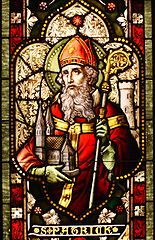
The Life And Writings Of Saint Patrick -Saint Patrick
I.—ARMAGH PILGRIMAGE
Armagh, as the primatial See of Patrick, was, even during his own lifetime, regarded as the most sacred city of the Gael, because, as Fiacc said, it was the seat of Patrick’s Spiritual Sovereignty. With the flight of years the other centres of sovereignty in Ireland—Emania, Tara, Ailech, Cashel, and Cruachan—had all become waste and silent, so that the hearts of the people were turned all the more to the great centre of the spiritual authority at Armagh, until the day when Patrick’s Heir was driven far from his sacred city, and no Catholic prelate or priest was allowed to dwell within its bounds. There were many circumstances to intensify this feeling. It was by command of God’s Angel St. Patrick chose Armagh to be his residence and see. When he was marking out and blessing the site of his Cathedral on the Hill of Macha, the same Angel of God went before him to guide his footsteps and bless the ground with Patrick. On his journey thither, most probably on that occasion, as he neared Armagh, a great stone lay on the narrow road before his chariot, but the angels took away the stone, laying it on one side, where it stood for ages and was called Lee innan Aingel, says the Tripartite. ‘And it was from that place, namely from Druimchaili, Patrick blessed Armagh out of his two hands’—not one but both his hands he raised aloft over against Armagh, begging God to give his blessing for all time to the city of his choice; and the Book of the Angel tells us that he ‘loved his city of Armagh before all other places.’ The same authority tells us that there was a well in the eastern part of the said city of Armagh, and Patrick used to go there ‘to baptise the great multitudes of men and women, who doubtless came thither from all parts, and to instruct them and cure them’ at the holy well. And there he was before the dawn of day awaiting the crowds when sleep overpowered his wearied limbs, and during his slumber he was favoured with the vision of the Angel, who announced the future greatness of the city and parochia of Armagh, as we have elsewhere explained.
It is no wonder, therefore, that its churches, and wells, and relics, and ramparts, all so intimately associated with Patrick, and so specially blessed by him and his guardian Angel, should become a favourite place of pilgrimage for all the children of the Gael.
We find, for instance, frequent reference in the Annals to princes and prelates from different parts of Ireland who died on their pilgrimage at Armagh. It is well known that in 1004 the great Brian Boru, the Imperator Scotorum, accompanied by the princes of Ireland, though warring at the time against the north, went in a penitential spirit to Armagh, and laid an offering of twenty-two ounces of gold on Patrick’s altar. His secretary at the same time made an entry in the Book of Armagh in which he formally recognised, on behalf of his master, the supremacy of Patrick’s see over all the land of Erin, including his own Southern province of Cashel or Maceria, as he somewhat quaintly renders the Irish name into Latin.
But in after ages, when Armagh fell into the hands of the English and became the residence of the Protestant primate, who had no love for shrines or pilgrimages, it was no longer possible to visit Armagh as a pilgrim. Catholic antiquaries might visit the city and the Cathedral of Patrick, but they dare not kneel to say a prayer lest they should be summarily expelled from its precincts. All that has been happily changed; and once more the pious pilgrim who comes to Armagh to honour Patrick will find new temples and shrines and altars, if not holier, certainly more beautiful and artistic than ancient Armagh ever saw in the palmiest days of its chequered history.

 Keep Site Running
Keep Site Running